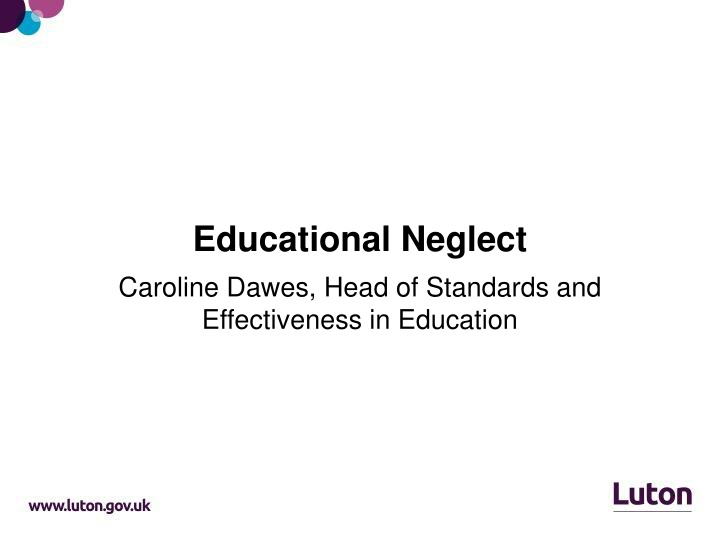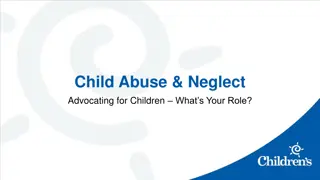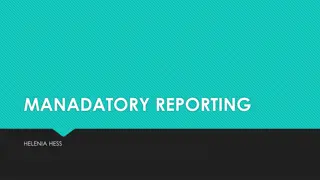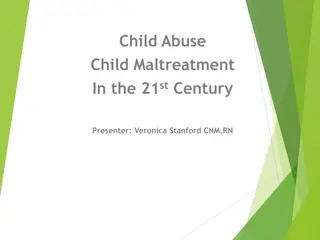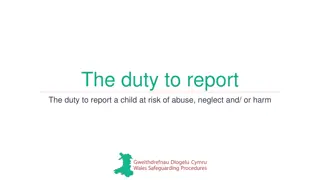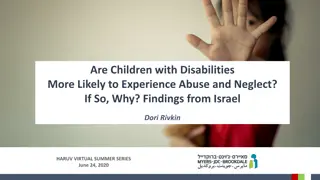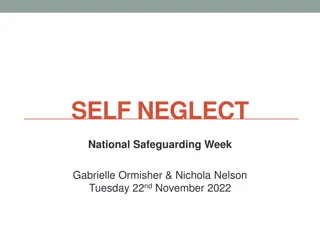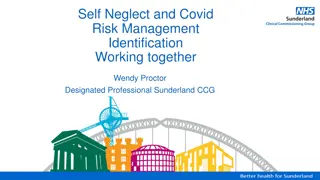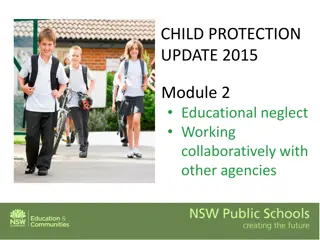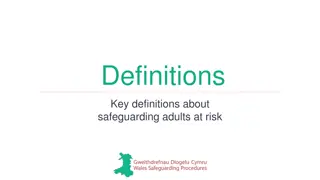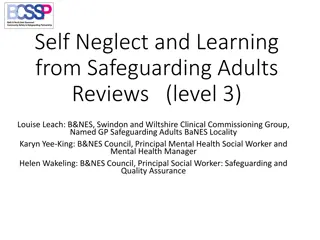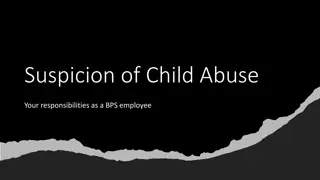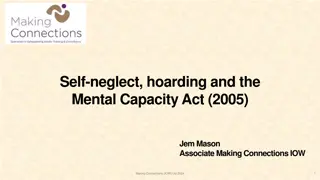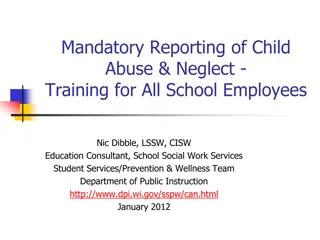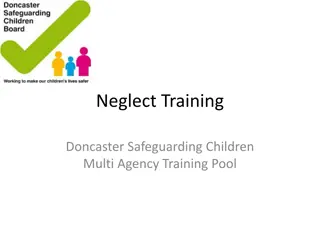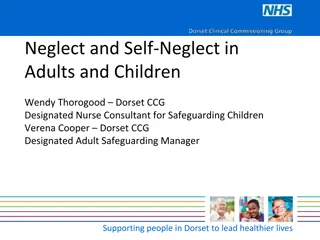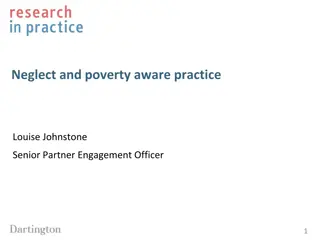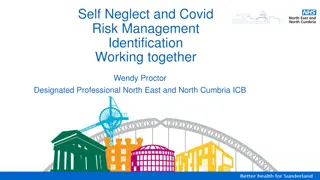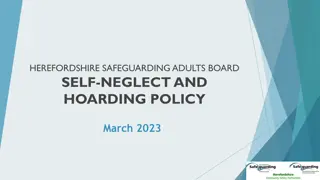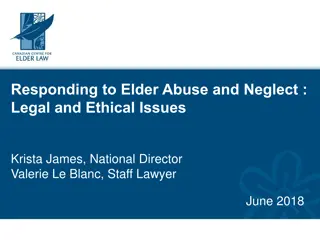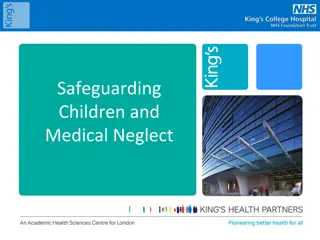Educational Neglect
Explore the concept of educational neglect, responsibilities for ensuring a suitable education, and the United Nations Convention on the Rights of the Child pertaining to education. Topics include school attendance, children missing education, home education, and the role of various parties like local authorities, schools, and parents. Learn about the rights of children to education, including primary, secondary, and higher education, as well as the development of their personality and respect for human rights and cultural identities.
Download Presentation

Please find below an Image/Link to download the presentation.
The content on the website is provided AS IS for your information and personal use only. It may not be sold, licensed, or shared on other websites without obtaining consent from the author.If you encounter any issues during the download, it is possible that the publisher has removed the file from their server.
You are allowed to download the files provided on this website for personal or commercial use, subject to the condition that they are used lawfully. All files are the property of their respective owners.
The content on the website is provided AS IS for your information and personal use only. It may not be sold, licensed, or shared on other websites without obtaining consent from the author.
E N D
Presentation Transcript
Educational Neglect Caroline Dawes, Head of Standards and Effectiveness in Education
Overview of sessions 1) Expectations and responsibilities for school attendance 2) Children Missing Education 3) Elective Home Education 4) Education Welfare Service
Neglect What do we mean by neglect ?
So what does Educational Neglect mean? Who is responsible for ensuring children have a suitable education? LA? Schools? Parents?
United Nations Convention on the Rights of the Child Article 28 1. States Parties recognize the right of the child to education, (a) Make primary education compulsory and available free to all; (b) Encourage the development of different forms of secondary education, including general and vocational education, make them available and accessible to every child, and take appropriate measures such as the introduction of free education and offering financial assistance in case of need; (c) Make higher education accessible to all on the basis of capacity by every appropriate means; (d) Make educational and vocational information and guidance available and accessible to all children; (e) Take measures to encourage regular attendance at schools and the reduction of drop-out rates. 2. States Parties shall take all appropriate measures to ensure that school discipline is administered in a manner consistent with the child s human dignity and in conformity with the present Convention. 3. States Parties shall promote and encourage international cooperation in matters relating to education, in particular with a view to contributing to the elimination of ignorance and illiteracy throughout the world and facilitating access to scientific and technical knowledge and modern teaching methods. In this regard, particular account shall be taken of the needs of developing countries.
United Nations Convention on the Rights of the Child Article 29 1. States Parties agree that the education of the child shall be directed to: (a) The development of the child s personality, talents and mental and physical abilities to their fullest potential; (b) The development of respect for human rights and fundamental freedoms, and for the principles enshrined in the Charter of the United Nations; (c) The development of respect for the child s parents, his or her own cultural identity, language and values, for the national values of the country in which the child is living, the country from which he or she may originate, and for civilizations different from his or her own; (d) The preparation of the child for responsible life in a free society, in the spirit of understanding, peace, tolerance, equality of sexes, and friendship among all peoples, ethnic, national and religious groups and persons of indigenous origin; (e) The development of respect for the natural environment.
Responsibilities Local Authority Provide sufficient school places 5-16 Ensure sufficient places for Education, Employment, Training 16-18 Ensure sufficient childcare places Schools Provide high quality education Parents Must ensure their child receives education at school or otherwise
Educational Neglect It is parents responsibility to ensure their child receives a suitable education at school or otherwise If parents are not ensuring their child receives a suitable education at school or otherwise then could this be educational neglect?
Schools Provide education Provide safety Registered state-funded schools are regulated by Ofsted Registered independent schools are regulated by the DfE Unregistered schools are not regulated and are illegal Tuition centres are not regulated and are legal Luton Unregistered Schools Strategy
Educational Neglect - direct If parents: Do not send their children to school Do not send their children to school often enough Do not provide a suitable education at home Then: They are denying their children their right to education How do we know they are safe?
Educational Neglect - indirect Poor attendance at school from primary onwards is a risk factor for criminal exploitation and contextual safeguarding risks. Children s attendance at school is monitored daily absence is easily measured. If parents are not sending their children to school every day, could this be a proxy indicator of wider risks of neglect? Are they receiving vaccinations? Health checks? Dentist checks? Are parents struggling with other pressures? Are the children acting as carers? Improving attendance at school is now everyone s responsibility
Conclusion Absence from school is a risk factor for many aspects of neglect, including educational neglect, Aspects of educational neglect that could interface with children s social care: CME (Children Missing Education - Mansoora Karimuddin) EHE (Elective Home Education - Tracy Gentle) EWS (Education Welfare Service - Julia Jack)
